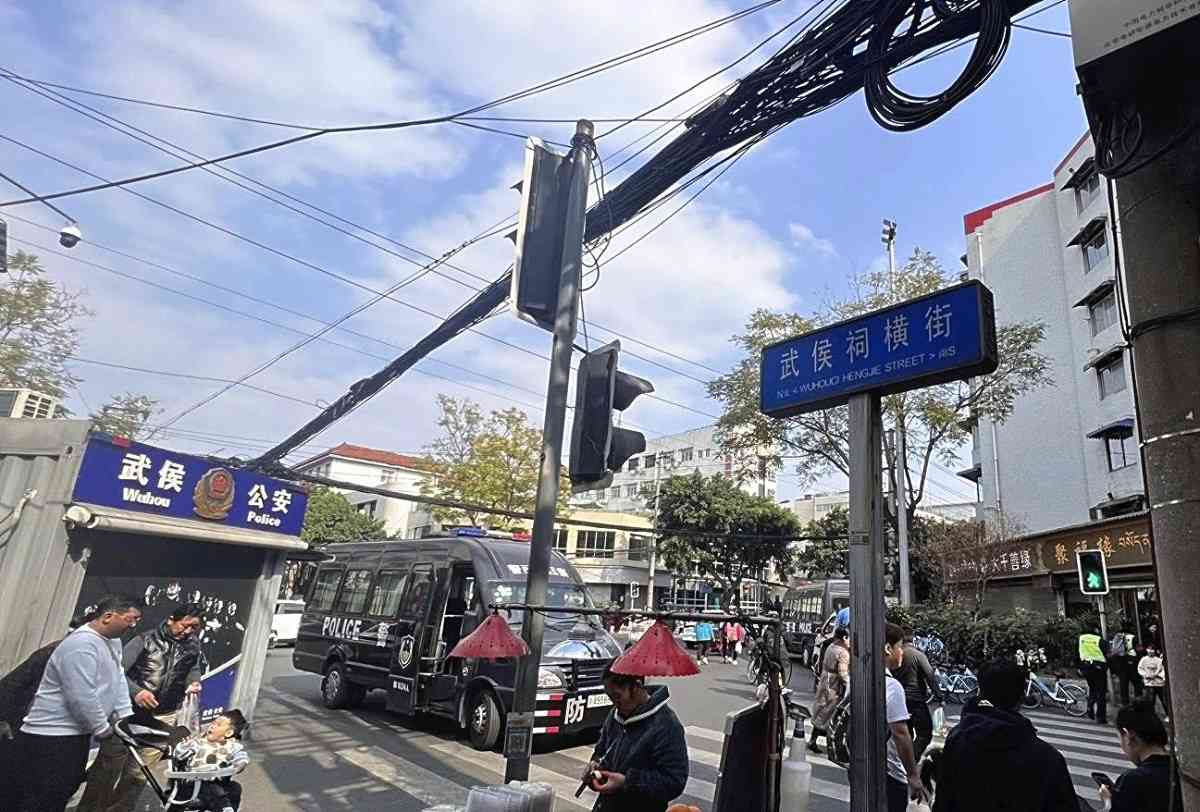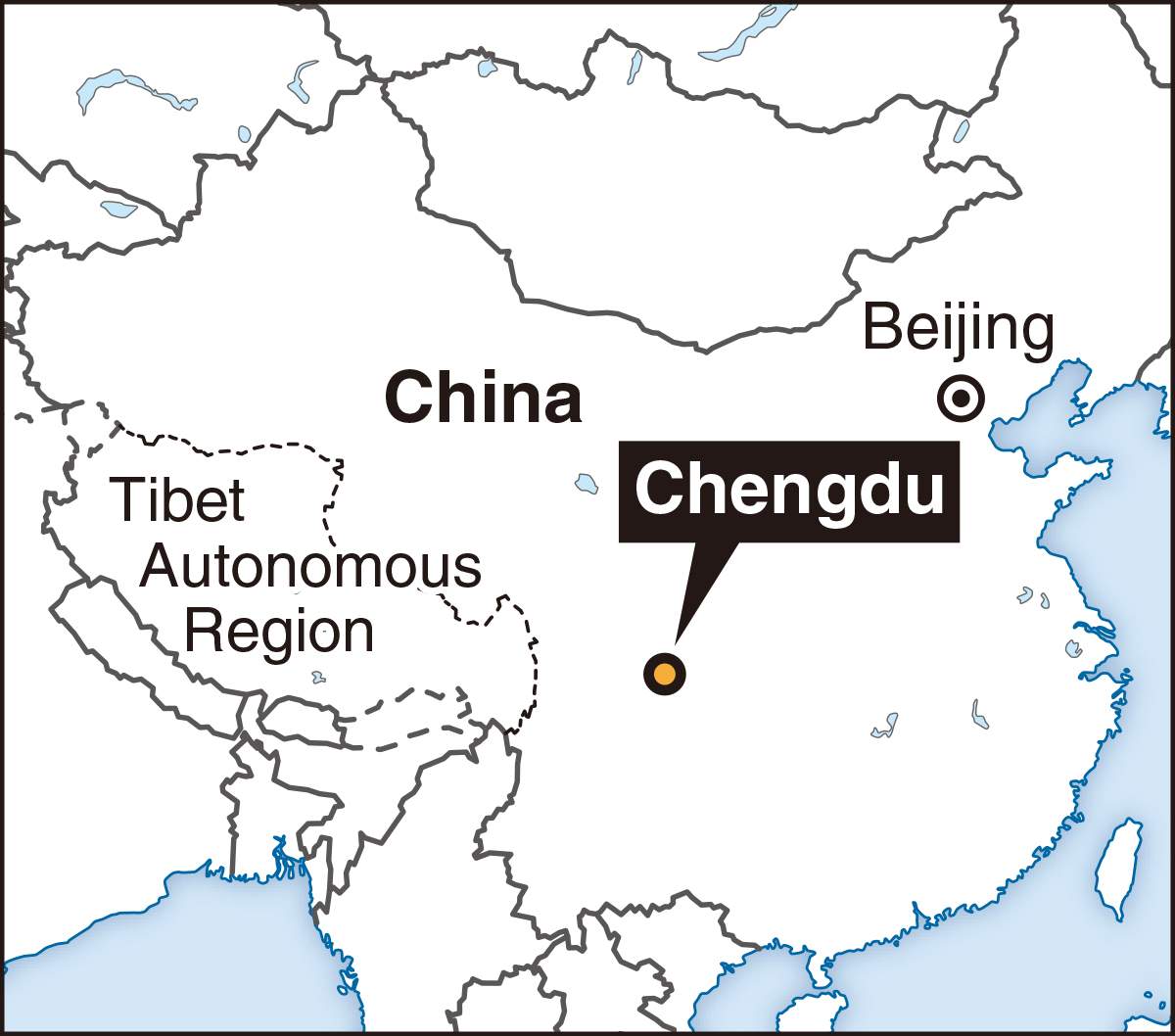
Police vehicles are deployed at an intersection, where Tibetans gather, in Chengdu, China, on Feb. 17.
1:00 JST, March 16, 2024
CHENGDU, China — As Tibet on Thursday marked the 16th anniversary of a 2008 uprising against Chinese rule of the autonomous region, Chinese President Xi Jinping continues to tighten state control of ethnic Tibetan communities in China.
It is part of a policy to thoroughly assimilate Tibetans, ignoring international criticism as a violation of human rights.

In one area of Chengdu, Sichuan Province, a line of shops sells Tibetan Buddhist altar objects and Tibetan-language books. During a visit in mid-February, heavily armed police officers could be seen stationed at every corner of an intersection, keeping a watchful eye on Tibetan monks and residents. There were many surveillance cameras.
Entering a shop for Buddhist objects, there are noticeably more signs written in Chinese than in Tibetan. A monk shopping in the store said in a low voice, “We have to preserve our religion and culture.”
China is home to about 7 million Tibetans, and the government is rapidly implementing a policy of assimilation.
According to a U.N. Human Rights Council report issued in 2023, almost all classes in boarding schools for children are taught in Chinese, and the study of Tibetan language and culture has been excluded.
In January, the U.S. government-affiliated Radio Free Asia reported that the Chinese authorities began prohibiting Tibetan children from taking outside classes to learn Tibetan culture and religion.
The “Report on the Work of the Government,” adopted at the recently completed National People’s Congress, states that China will “provide guidance to religions so that they can adapt themselves to our socialist society.”
The report also stipulates that China will pursue a policy of the Sinicization of religion, which means prioritizing loyalty to the Chinese Communist Party over religious beliefs.
International condemnation of China is growing. According to a Reuters report, on March 4, U.N. High Commissioner for Human Rights Volker Turk urged Beijing to “implement recommendations to amend laws that violate fundamental rights,” including in the Xinjiang and Tibet autonomous regions.
However, a Chinese Foreign Ministry spokesperson rebuffed the commissioner’s call, claiming that China is the victim of “concocted rumors and lies” by some Western countries.
The Xi administration does not appear to be concerned with addressing the human rights situation in the country.
In the English version of the latest “White Paper” on Tibet released by China last autumn, the Chinese term “Xizang” was used instead of “Tibet.” China’s stance is to emphasize that Tibet is part of China and to seal itself off from interference from the West.
It appears that Xi will not tolerate a repeat of the events that started on March 14, 2008.
On that day, riots broke out in the Tibetan capital of Lhasa, as monks and citizens dissatisfied with Chinese rule and the suppression of religion set fire to and destroyed government buildings and other places.
The unrest spread to Tibetan communities in other provinces, including Sichuan and Gansu, and Chinese authorities called out the military to suppress the rioters. According to the Tibetan government-in-exile in India, over 200 people were killed in the unrest.
Top Articles in World
-

Israeli Ambassador to Japan Speaks about Japan’s Role in the Reconstruction of Gaza
-

Videos Plagiarized, Reposted with False Subtitles Claiming ‘Ryukyu Belongs to China’; Anti-China False Information Also Posted in Japan
-

Nepal Bus Crash Kills 19 People, Injures 25 Including One Japanese National
-

China, India Tapping into Promising African Market; Beijing Announces Tariff Cuts, Both Countries Aim to Expand Exports
-

Ukrainian Ambassador Closely Watching Japan’s Revision of Defense Export Rules, Hopes for Future Arms Support
JN ACCESS RANKING
-

Producer Behind Pop Group XG Arrested for Cocaine Possession
-

Japan PM Takaichi’s Cabinet Resigns en Masse
-

Man Infected with Measles Reportedly Dined at Restaurant in Tokyo Station
-

Israeli Ambassador to Japan Speaks about Japan’s Role in the Reconstruction of Gaza
-

Videos Plagiarized, Reposted with False Subtitles Claiming ‘Ryukyu Belongs to China’; Anti-China False Information Also Posted in Japan

























